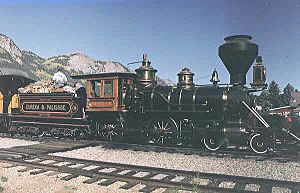Eureka (locomotive) facts for kids
Quick facts for kids Eureka |
|
 |
|
| Power type | Steam |
|---|---|
| Builder | Baldwin Locomotive Works |
| Serial number | 3763 |
| Model | 8/18 C |
| Build date | 1875 |
| Configuration | 4-4-0 |
| UIC classification | 2′B n |
| Gauge | 3 ft (914 mm) |
| Driver diameter | 42 in (1,067 mm) |
| Locomotive weight | 22 short tons (20.0 t) |
| Fuel type | Wood |
| Boiler pressure | 120 psi (0.83 MPa) |
| Cylinders | Two, outside |
| Cylinder size | 12 in × 16 in (300 mm × 410 mm) |
| Tractive effort | 5,595 lbf (24.89 kN) |
| Retired | 1896 (E&P); 1938 (SNW&L); 1976 (WB) |
| Restored | 1991 |
| Current owner | Daniel Markoff |
| Disposition | Restored to operating condition; privately owned |
The Eureka is a special steam train engine that lives in Las Vegas, Nevada. It's owned by a private collector. This amazing engine is one of only three Baldwin Class 8/18 C 4-4-0 locomotives still around in the United States. What makes it extra special is that it's the only one that can still run! Because of its history, it's listed on the United States National Register of Historic Places.
Contents
The Eureka's Early Life
The Eureka was built in 1875 by a company called Baldwin Locomotive Works. They were located in Philadelphia, Pennsylvania. This steam engine was made for the Eureka and Palisade Railroad in Nevada.
Working on the Railroad
The railroad's main job was to carry people and goods. It connected the mining town of Eureka, Nevada to the Central Pacific Railroad. This connection point was in Palisade, Nevada. The Eureka worked hard on this railroad until 1896.
New Owners and New Jobs
In 1896, the Eureka was sold to the Sierra Nevada Wood and Lumber Company. It helped this company until 1938. After that, the company closed down. The engine was then sold to a dealer who bought old metal.
A Star on the Big Screen
In 1939, a famous movie studio, Warner Bros., bought the Eureka. This old train engine became a movie star!
Eureka's Film Appearances
The Eureka appeared in many films. Some of these movies include Torrid Zone, Cheyenne Autumn, and The Great Train Robbery. Its last movie role was in the 1976 film, The Shootist.
Helping Another Train
In 1978, another museum, the California State Railroad Museum, was fixing up a similar train. This train was called the North Pacific Coast no. 12 Sonoma. The Eureka was taken apart to show its original paint. This helped the museum restore the Sonoma to look just like it did long ago.
A Fire and a New Home
Later, the Eureka was sold to an amusement park called Old Vegas. It was put on display there in 1980. Sadly, in 1985, a fire happened at Old Vegas. A burning building fell on the Eureka, causing a lot of damage.
A New Beginning
A year after the fire, a lawyer from Las Vegas named Dan Markoff found the damaged engine. He bought the Eureka and decided to fix it.
Bringing Eureka Back to Life
With the help of his father, Dan Markoff worked hard to restore the Eureka. They made it able to run again! The newly restored Eureka was shown for the first time in 1991. This was at a big train event called Railfair '91.
Special Recognition
In 1993, the Eureka ran on private tracks in Plaster City, California. On January 12, 1995, the Eureka was listed as a historic structure. It was the first transportation item in Las Vegas to be on the National Register of Historic Places. This means it's a very important part of history!
Traveling and Preserving History
In 1997, the Eureka traveled to Chama, New Mexico. It took part in special trips on the Cumbres and Toltec Scenic Railroad. The engine still visits different narrow gauge tourist railroads for special events. These include the Cumbres and Toltec, the Durango and Silverton Narrow Gauge Railroad, and the Nevada State Railroad Museum.
When the Eureka isn't traveling, it's kept safe. Dan Markoff has a special shed where it is stored. This shed is not open to the public. Dan is very careful about how often the engine runs. This is because it still has its original boiler and many other old parts. He wants to make sure this historic engine lasts for many more years.
 | Misty Copeland |
 | Raven Wilkinson |
 | Debra Austin |
 | Aesha Ash |

